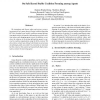Free Online Productivity Tools
i2Speak
i2Symbol
i2OCR
iTex2Img
iWeb2Print
iWeb2Shot
i2Type
iPdf2Split
iPdf2Merge
i2Bopomofo
i2Arabic
i2Style
i2Image
i2PDF
iLatex2Rtf
Sci2ools
ATAL
2004
Springer
2004
Springer
On Safe Kernel Stable Coalition Forming among Agents
We investigate and discuss safety and privacy preserving properties of a game-theortic based coalition algorithm KCA for forming kernel stable coalitions among information agents in face of imperfect information on actual coalition values, and changing agent society. In addition, we analyze the chances of deceiving information agents to succeed in coalition negotiations using the KCA protocol. We show that a certain type of fraud which leads to an increase of individual profit can neither be prevented nor detected, but this comes at the expense of exponentially high computation costs for the deceiving agent.
Related Content
| Added | 30 Jun 2010 |
| Updated | 30 Jun 2010 |
| Type | Conference |
| Year | 2004 |
| Where | ATAL |
| Authors | Bastian Blankenburg, Matthias Klusch |
Comments (0)

